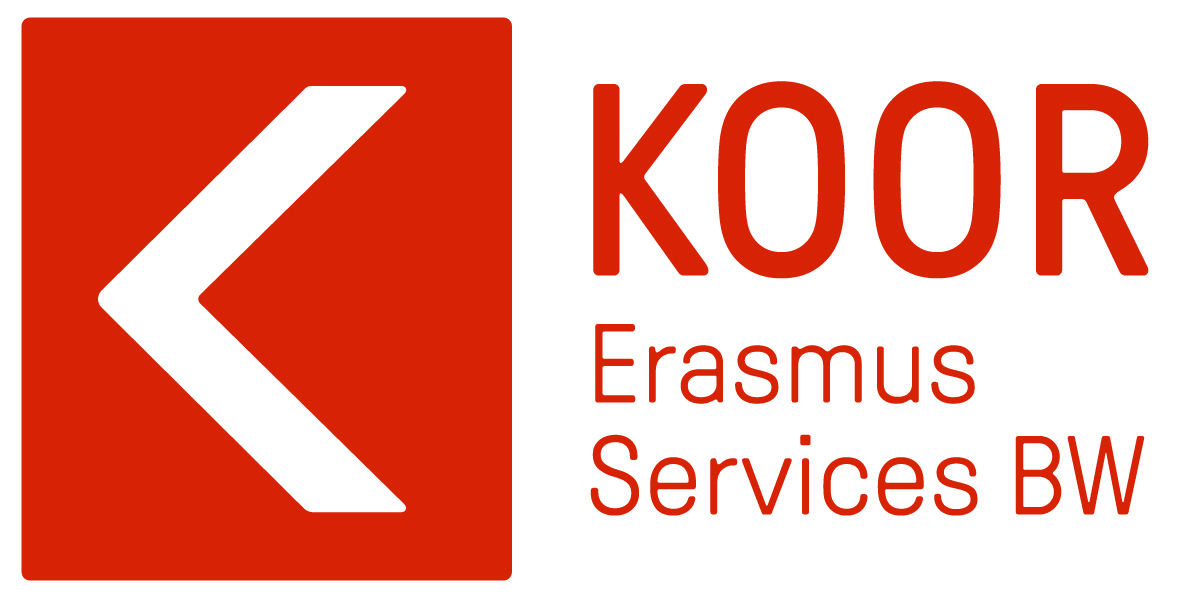
Eligibility Requirements
Who can apply?
Students and PhD students with European or non-European citizenship can apply for Erasmus+ funding with us if...
- they want to do an internship in a public or private institution in one of the 32 participating programme countries or worldwide,
- they still have enough Erasmus+ funding days available from their quota,
- their university is a consortium partner of KOOR - Erasmus Services BW,
- they are regularly enrolled for the entire duration of the internship at one of the higher education institutions participating in the KOOR – Erasmus Consortium BW and are pursuing a full-time or part-time degree there.

Graduated students with European or non-European citizenship can apply for Erasmus+ funding with us, if...
- they want to do an internship in a public or private institution in one of the 32 participating program countries,
- they still have Erasmus+ funding days left from the previous study phase,
- they apply for funding while they are still enrolled,
- they have graduated before starting their traineeship,
- they are exmatriculated throughout the whole traineeship, i.e. they have completed all necessary coursework and exams for graduation,
- the traineeship is completed within twelve months* of their graduation.
If you are a non-European national, please find out in good time whether you need a visa or a work permit in the host country. Please contact the respective consulate or embassy of your destination country for further information. Information on the labor law conditions can be obtained from the respective labor administration of the destination country
Which stays are eligible?
Long-term internships:
- comprise a minimum of 2 and a maximum of 12 months, with each month being counted as 30 days.
- Target group: students, enrolled PhD students, graduates
Blended long-term internships:
- include at least 2 and a maximum of 12 months physically on site, each month is counted as 30 days. include a virtual phase (remote work in the home country) of at least one day
- Target group: students, enrolled PhD students, graduates
Short term internships:
- include at least 5 and a maximum of 30 days physically on site
- Target group: enrolled PhD students
Blended short-term internships:
- Include at least 5 and a maximum of 30 days physically on site and a virtual phase (e.g. onboarding, training, workshops or similar) of at least one day
- Target group: enrolled PhD students, students and graduates with fewer opportunities (with children, with disabilities, with chronic illnesses, first-time academics and working students) as well as students whose SPO requires a short-term internship of at least five and max 30 days on site and at least one virtual day (home office in the home country).
Which target countries are supported?
Programme countries
- All Member States of the EU: Austria, Belgium, Bulgaria, Croatia, Cyprus, Czech Republic, Denmark, Estonia, Finland, France, Greece, Hungary, Ireland, Italy, Latvia, Lithuania, Luxembourg, Malta, Netherlands, Poland, Portugal, Romania, Slovakia, Slovenia, Spain, Sweden, and the associated overseas territories
- Countries of the EEA (Iceland, Liechtenstein, Norway)
- Turkey
- North Macedonia
- Serbia
Partner Countries - worlwide
A list of the Erasmus+ partner countries can be found here
Which traineeships can be funded?
- Your internship location must be in one of the countries participating in the program (see target countries).
- Internships can be completed, for example, in companies, research institutions and universities, NGOs, foundations, associations, chambers, schools, institutes, educational centers, public institutions and hospitals. Excluded from funding are European institutions (such as internships in a political group or with a member of the EU Parliament) as well as institutions that administer EU programs or that are funded by EU funds.
- Compulsory internships, research internships, PJ-Tertials, teaching internships, voluntary internships, graduate internships as well as the practical part of theses are funded. The mere writing of theses is not eligible!
- The internship must be a full-time internship, i.e. the weekly working hours should be 30-40 hours/week.
Until when do I have to apply for an Erasmus+ grant?
- Registration is currently open for internships starting between 01 January 2026 and 31 August 2026.
- Internships starting from 01 September 2026 onwards will be funded under the 2026 project. Registration for this period is expected to open in June 2026.
Your fully completed and signed Erasmus application documents must be received by KOOR – Erasmus Services BW no later than two weeks before the start of your internship. Therefore, the application deadline does not refer to the date of registration, but to the upload date of the final application document.
Applicants planning an internship at schools and universities, including university hospitals and university research institutions, are given a one-week application deadline all year round (same weekday of the previous week) in order to avoid any closing times during the (semester) holidays.
Please allow several weeks lead time as you will need to obtain various signatures from your university and your host organisation.
Repeated funding / Double funding / Partial funding
Repetitive funding
In total, students can receive funding for up to 36 months of study and/or internship:
- in each of the bachelor's, master's, and doctoral programs, up to twelve months (=360 days),
- in one-term programs (e.g., medicine, state examination, old diploma programs) up to 24 months (=720 days) and an additional twelve months (=360 days) in doctoral studies,
- the funding can be divided and within a study cycle also be used several times (eg for two times six months).
- internships in Erasmus+ partner countries (WORLDWIDE) can only be funded once per student and per project year.
Double funding
- There must be no double funding by the EU , i.e. you may not simultaneously claim another EU grant or work on a project funded by the EU in addition to the Erasmus Internship Grant. Please inform us in the latter case so that we can make an individual check.
- The simultaneous receipt of an Erasmus Internship Scholarship and another DAAD scholarship (e.g. the Bachelor Plus Scholarship) is excluded on the part of the DAAD. Should you receive a DAAD scholarship, please consult with the respective contact person.
Partial funding
Partial funding is not possible. The traineeship period has to match the Erasmus+ funding period (regardless of whether the funding period is financially funded as a whole or also consists of zero-grant shares). In fact, the Erasmus+ funding period can be made up as follows:
- Pure financial support
- Pure zero-grant funding
- Combination of financial support and zero-grant funding
In order for your internship to be funded, you must still have sufficient funding quota for the entire internship period (i.e. Erasmus+ funding period), since both financial and zero-grant shares are counted towards the funding quota. Partial funding after the start of the internship is also not possible.
Short-Term stays
As person of the group "fewer opportunities", to which persons with a disability of 20 percent or more, people with chronical disesases or people with child(ren) belong, you also have the possibility of doing a short-term stay abroad. The possibility of short-term stays abroad is reserved for people of the above mentiones group, students whose examination regulations scheduled a short-term internship, and doctoral students.
The following criteria apply:
- only possible in Erasmus+ programme countries
- Length of stay: min. 5, max. 30 days of being in the destination country physically
- Funding rates according to a daily sum:
- 1. to 14. day: 79 €/day
- 15. to 30. day 56 €/day
- travel allowance
- Short-term stays must be supplemented by a mandatory virtual component (of at least one day's duration) that enables a shared online learning experience and teamwork. Doctoral students are exempt from this regulation.
- Scope: min. 3 ECTS / if no ECTS are being distributed, a workload that equals 3 ECTS should be done.

